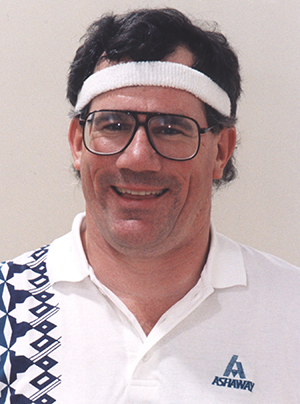|
|
Racquet Stringers Should Advise More,
Consent Less, Says Ashaway's Steve Crandall
|

In a recent column on the risks of polyester string, Ashaway's Steve Crandall said that it is the job of a racquet technician to advise his or her clients on proper string choice, and that doing so is good for business. |
While The Risks Of Polyester Strings Are Well Known, Advising Clients On The Proper String Alternatives Can Be Good For Business
In a recent column on the risks of polyester string, Ashaway's Steve Crandall said that it is the job of a racquet technician to advise his or her clients on proper string choice, and that doing so is good for business. Crandall noted that while top pros may be able to get more spin with poly strings, most recreational players cannot. What they do get, he said, is less power from the strings and increased shock to their arms and joints, often resulting in injury. But his main point in the article is that this is a common problem, well-known within the racquet stringing community, and one that stringers need to address.
Crandall quoted Master Racquet Technician John Gugel, who has been known to decline to string racquets for juniors with poly string. "Anybody can be an order taker," said John, "and a robot could probably be programmed to string a racquet. If you work that way, you build no customer rapport and consequently, no customer loyalty. Your business devolves to a simple matter of price."
On the other hand, working with a customer to find the right string does build rapport and loyalty. It demonstrates your expertise, which is your true value, and keeps the customer coming back for more, and making referrals. John's business is referral based so his clients are normally predisposed to making a change. "We really try to help players avoid arm issues," he said, and offered a list of five questions he uses to help players select the proper string for their game.
A key issue for John is working with coaches who know their players but may not be familiar with the many string alternatives. "We need to work with them to get better stringing outcomes," he said. "It is certainly not a good idea to bypass them, but then, players who are in pain are not going to be taking lessons from any pro!"
Crandall said one of the best alternatives to polyesters are PEEK polymers - the best known of which is Zyex® monofilament, sold by Ashaway as MonoGut® ZX and ZX Pro. "These materials have a number of properties that make them well suited for racquet strings and, we believe, a better option than polyester," he said. These properties include low dynamic stiffness and a low coefficient of friction that combine to allow the strings to easily slide across each other and snap back forcefully, generating spin. The same ability to stretch and snap back forcefully generates shot power, which polyester does not do, and increases 'dwell time' of the ball on the strings, enhancing control. Finally, PEEK has an excellent ability to retain tension longer than other materials, increasing the playing life of the string - polyester does not.
Steve Crandall's complete column, "Recommending PEEK Monofilaments for Your Customers Can Improve Your Business," can be found here.
|

